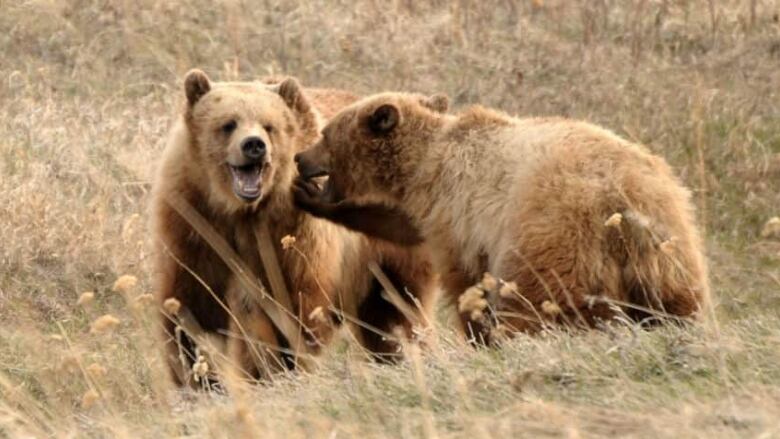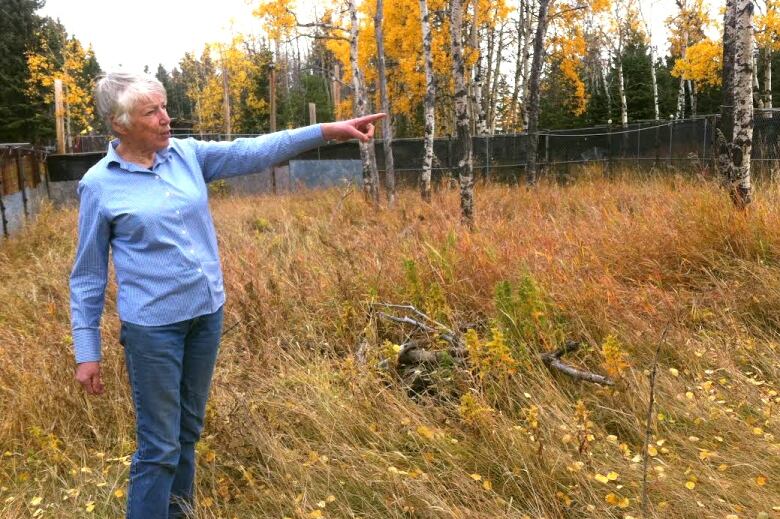24 orphaned bear cubs euthanized in 5 years because of Alberta policy
'They prefer to go out and shoot them,' says wildlife refuge operator

Earlier this month, Cochrane's Clio Smeeton got the phone call she hascome to expect every fall: a pair of orphaned bear cubs had been found.
The caller wanted to know if Smeeton's wildlife rehabilitation centre, the Cochrane Ecological Institute, could take in the two baby bruins.Smeeton had to say no.
That's because since2010, wildlife refuges in Alberta have been forbidden from rehabilitating orphaned bear cubs.
"I just feel so frustrated," said Smeeton, who has cared for orphaned bears for 25 years at her facility.

"They should say to themselves, 'We have a facility here, it's free, it doesn't cost us anything. The bears will be OK, and the public will be happy.' They can do that. But they prefer not to. They prefer to go out and shoot them," she said.
Since the province brought in the policy five years ago,24 young bears have been euthanized. Three of those were grizzly cubs, a species listed as threatened in the province.
Safety concerns
Alberta Environment spokesmanTravis Ripleysays researchers and biologists generally agree that rehabilitated bears tend to have a lack of fear from humans whichcan be a hazard if they wander back into populated areas.
- Grizzly bear population in Alberta's Foothills has doubled, finds study
- Alberta grizzly bears need habitat protection, conservation group says
- Baby bears chewing on litter near Highway 93 raises concerns
Rehabilitated bears released back into the wild also face many challenges.
"We know ... from attempts to relocate bears, that when you do that, the bears get into trouble with local bears, and their survival is one-fifth of what it would be if they hadn't been relocated," saidMarkBoyce,Alberta Conservation Association chair in fisheries and wildlife at the University of Alberta.
He says finding food can be difficult for rehabilitated bears, as they haven't learned from their mothers how to forage.
"To take a bear raised in captivity and release it in the wildis a kiss of death for the bear," said Boyce.
Human-bear co-existence possible, says researcher
"There area lot of bears in Alberta that are already interacting with people quite regularly, and we manage that," saidSarahElmeligi, aformer conservation planner with the Canadian Parks and Wilderness Society (CPAWS).

Elmeligi, who is now aPhD candidate studying national park bears and how they navigate around hikers,points out that many Rocky Mountain bears arealreadyhabituated.
"One of the things that we've learned from these communities like Banff and Canmore that live on this urban wilderness interface is that co-existence is possible."
While B.C.and Ontario do allow bear cubs to be takenin by wildlife rescuecentres, Alberta Environment saysprotocols for rehabilitating orphaned bears would need to be studied closely before any changes are made in theprovincial policy.
- Conservation officer suspended for refusing to kill bear cubs
- Littlefoot grizzly bear cub released back into wild
Ripley says not enough is known yet about how wellrehabilitated bears do after being released into the wild, but does point to an unpublished B.C. study that showed three of 17 orphaned grizzly cubs released from a facility were killed after getting into conflicts with humans.












_(720p).jpg)


 OFFICIAL HD MUSIC VIDEO.jpg)
.jpg)



























































































